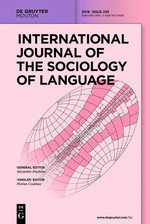永久开放
【限时资源,期刊全文】International Journal of the Sociology of Language《国际语言社会学杂志》2019年论文集(侵删)
2032 阅读 16 下载 2020-06-24 18:14:01 上传 77.77 MB
本篇推送的是权威期刊——International Journal of the Sociology of Language《国际语言社会学杂志》2019年论文集,共51篇论文,其中目录可在正文中查看,全文可以点击文末附件列表下载,下载链接即日
International Journal of the Sociology of Language《国际语言社会学杂志》2019年论文集
资料整理:张明辉(微信:zhangxiaojian160408)
(注意:今天的资源分两个附件,下载时切勿遗漏!)
(下载链接三天内有效,失效后请联系小编微信索取)

| 论文号 | 论文号 | 论文题目 |
| Issue 255 | Article01 | Language, heritage, and family: a dynamic perspective—Introduction |
| Issue 255 | Article02 | Changing orientations to heritage language: The practice-based ideology of Sri Lankan Tamil diaspora families |
| Issue 255 | Article03 | The dynamics of Hawaiian speakerhood in the family |
| Issue 255 | Article04 | Imagination as a key factor in LMLS in transnational families |
| Issue 255 | Article05 | “Prétendre comme si on connaît pas une autre langue que le swahili”: Multilingual parents in Norway on change and continuity in their family language policies |
| Issue 255 | Article06 | When X doesn’t mark the spot: the intersection of language shift, identity and family language policy |
| Issue 255 | Article07 | Guiding parents towards raising bilingual children |
| Issue 255 | Article08 | Success stories in family language policy |
| Issue 256 | Article09 | The interactional making of a “true transsexual”: Language and (dis)identification in trans-specific healthcare |
| Issue 256 | Article10 | The linguistic expression of gender identity: Albania’s “sworn virgins” |
| Issue 256 | Article11 | Discourses of transnormativity in vloggers’ identity construction |
| Issue 256 | Article12 | Self-misgendering among multilingual transgender speakers |
| Issue 256 | Article13 | “I am I”: Self-constructed transgender identities in internet-mediated forum communication |
| Issue 256 | Article14 | Trans self-identification and the language of neoliberal selfhood: Agency, power, and the limits of monologic discourse |
| Issue 256 | Article15 | Transgender voices |
| Issue 257 | Article16 | Introduction: Language and speakerhood in migratory contexts |
| Issue 257 | Article17 | Language surveillance: Pressure to follow local models of speakerhood among Latinx students in Madrid |
| Issue 257 | Article18 | Biographizing migrant experience |
| Issue 257 | Article19 | Unvoicing practices in classroom interaction in Galicia (Spain): The (de)legitimization of linguistic mudes through scaling |
| Issue 257 | Article20 | When language mixing is the norm: documenting post-muda language choice in a state school in Barcelona |
| Issue 257 | Article21 | Language socialisation and muda: The case of two transnational migrants in Emmaus Barcelona |
| Issue 257 | Article22 | Linguistic mudes: An exploration over the linguistic constitution of subjects |
| Issue 257 | Article23 | Monica Heller Bonnie McElhinny: Language, capitalism, colonialism: Toward a critical history |
| Issue 258 | Article24 | Introduction: Language in the mines |
| Issue 258 | Article25 | Fanakalo as a mining language in South Africa: A new overview |
| Issue 258 | Article26 | Katanga Swahili and Heerlen Dutch: A sociohistorical and linguistic comparison of contact varieties in mining regions |
| Issue 258 | Article27 | Grammatical features of a moribund coalminers’ language in a Belgian cité |
| Issue 258 | Article28 | From flamano to urban vernacular. Linguistic and meta-linguistic heritage of first generation miners in Flemish Limburg |
| Issue 258 | Article29 | Multilingualism and mixed language in the mines of Potosí (Bolivia) |
| Issue 258 | Article30 | The dialect of São João da Chapada: Possible remains of a mining language in Minas Gerais, Brazil |
| Issue 258 | Article31 | Discussion: Language in nature resource economies |
| Issue 258 | Article32 | Stuart Kirsch: Mining capitalism: the relationship between corporations and their critics |
| Issue 259 | Article33 | Literacy in the study of social change: Lusophone perspectives |
| Issue 259 | Article34 | Discourses about language and literacy education in Portugal: past and present |
| Issue 259 | Article35 | Timor-Leste 1974–1975: Decolonisation, a nation-in-waiting and an adult literacy campaign |
| Issue 259 | Article36 | Adult literacy in Timor-Leste: Insights from ethnographic research with teachers, learners and coordinators of contemporary literacy programs |
| Issue 259 | Article37 | A critical analysis of literacy discourses in two urban neighbourhoods in Brazil |
| Issue 259 | Article38 | Meanings of literacy in the intersection of religious and secular practices: examining local and global changes in a Brazilian bairro |
| Issue 259 | Article39 | Taking account of discourses, literacy practices and uses of texts in ethnographic research on educational inclusion: insights from two studies in Brazil |
| Issue 259 | Article40 | Opening up ideological spaces for multilingual literacies at the margins of the Portuguese education system? Ethnographic insights from a Russian complementary school |
| Issue 259 | Article41 | Judy Kalman and Brian Street: Literacy and numeracy in Latin America: local perspectives and beyond |
| Issue 260 | Article42 | A story at the periphery: Documenting, standardising and reviving Cypriot Arabic |
| Issue 260 | Article43 | The use of official languages in electronic communications in the Valencian local administration |
| Issue 260 | Article44 | Language use and intergenerational transmission of heritage Veneto in the rural area of Santa Teresa, Brazil |
| Issue 260 | Article45 | Yucatec Maya language planning and the struggle of the linguistic standardization process |
| Issue 260 | Article46 | Language shift and language revival in Crimea |
| Issue 260 | Article47 | Language and religion in Central Ukraine |
| Issue 260 | Article48 | A sociolinguistic approach to implicit language attitudes towards historically white English accents among young L1 South African indigenous language speakers |
| Issue 260 | Article49 | A sociolinguistic analysis of the use of English loanwords inflected with Arabic morphemes as slang in Amman, Jordan |
| Issue 260 | Article50 | Commodification of African languages in linguistic landscapes of rural Northern Cape Province, South Africa |
| Issue 260 | Article51 | Critical sociolinguistic research methods: Studying language issues that matter |
所需积分:0 分
永久开放
表情
图片
附件











